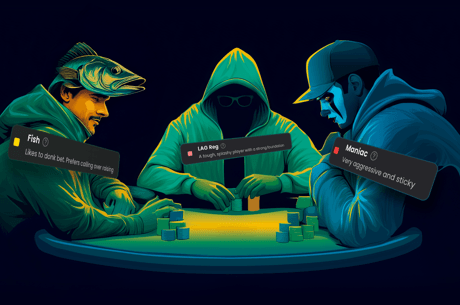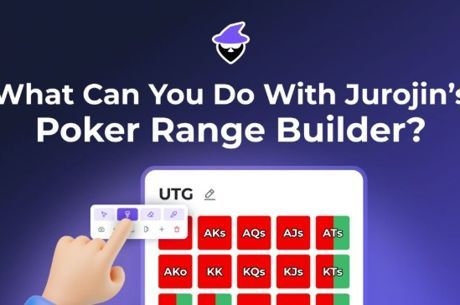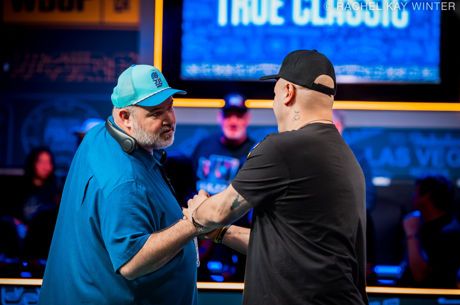Finding the Best Reaction to a Bad Result

When looking back at our own poker playing history, many of us find memories filled with an assortment of our biggest moments — good and bad.
There's the prideful climbing through levels of achievement as we outsmart tough opponents and nemeses du jour. There are the near misses of the big (and bigger) scores. And maybe there are even some breakthroughs to trophies and bracelets for the skilled and the fortunate.
Unfortunately, our history also includes memories of the low points — the stretches of consistent losing and huge beats. Whatever the causes, in a negative sum game the losing necessarily net-outweighs the winning, at least in our memories.
Even those lucky enough to be long term winners may lament their relative misfortune compared to others who are higher up the achievement ladder. The natural human propensity to compare ourselves to others and ruminate over negative results is likely an exaggerated tendency in our group — something strangers at the poker table telling you (unprompted) about their own bad beat stories will often unwittingly confirm.
Experiencing numerous negative results in a condensed timeframe has an effect on the human psyche. Because of this fact, it is important to learn how to handle those inevitable low points. It's important not just to work (or hope) to improve on the actual results of inevitable deficient luck, but to work on improving our immediate response to unsatisfying outcomes — and to begin to do so straight away with the next deal of cards.
For me, an example of just such a positive response that sticks out is a big hand from Day 3 of the 2013 World Series of Poker Main Event.
One-and-a-half days' worth of good cards, good tables, and favorable relative position were followed by half a day of "hanging on" at a table full of crushers, ending with my lucking into a flopped set over set to double up at the end of Day 2.
Some early run good at the start of Day 3 and all of a sudden we were up to a 250,000-chip stack equating to close to $100K in expected tournament equity. Friends were starting to get excited in their social media railing, and momentum seemed to be building for a deep WSOP run.
Part of live tournament poker is being able quickly to assess your new opponents as table breaks have you moving around the room and new players are steadily deposited into your vicinity to replace the busted. In this instance a mid-50s gentleman had been seated at our table for only an orbit. He possessed a touch of alpha posture and demeanor, had about a 180,000-chip stack mostly made up of 100/500/1K chips, and had played one hand in that first orbit, open-raising and then folding to a three-bet.
The blinds were 1,000/2,000 with a 300 ante. I was dealt aces in early position and raised to 4,800. One player called from middle position, then our new Villain three-bet to 21,000 from late position. Here we go!
It was a great set-up a smallish four-bet after which he could decide to five-bet (often all in) or flat-call and give us the chance to get it all in on many high equity flops by making just a smallish continuation bet over which he'd shove (with the ~1.25 effective stack-to-pot ratio if Villain called the four-bet).
The composition of his stack size — being small-chip heavy, indicating he'd obtained chips either by winning lots of blinds/antes/small pots or by knocking out a player who had — increased the odds that he'd be loose enough to continue with a wider range of hands here versus something more standard like [JJ+, AK] or [QQ+, AK].
I made it 48,000, and after thinking for 90 seconds Villain called. The flop then came AxQxQx.
And I was behind!
There were pauses, feigned contemplations, and other posturing before the chips finally went in on the River with Hero unimproved, knocking me down to 70,000 in chips.
As the hand played out I had hoped that the looseness and "random factor" of an unknown Villain was a bigger influence on his range. (In my one previous deep run in 2008 I'd put a newly-seated Dennis Phillips on aces, kings, or ace-king in a hand versus another player, only to see him turn over Kx3x-suited at the end.) Unfortunately, Villain held both of the queens instead of a looser-played hand like AxQx, KxQx-suited, QxJx-suited, or the like.
The point of this article is that despite the awful result, I have mostly positive emotions and memories of this hand because of my response thereafter.
Over the years, I've seen so many players spend two, three, or four days in the Main Event building up a stack necessarily through various forms of run good, then subsequently go on to seeming life-monkey tilt because they felt wronged in the moment after losing a 60-40 hand, or after missing their hands/draws for several orbits, or after getting frequently three-bet by a new opponent to their left. These emotions often manifest into making an impending "stack punt" much more likely than would have been the case otherwise.
In my own 2013 moment of outcome-related despair, I had 100 percent certainty and clarity such a negative fate wasn't going to be mine. I pulled out my index card on which I'd written my process goals for the tournament (a good habit I'd taken to for big live events).
Among those goals was one to have a "winning performance" on each hand I played (translation = stick to your process, stupid). Other specifics were also enumerated, including having clarity regarding all stack sizes at my table, player tendencies, and history, as well as paying attention in hands after I'd folded to notice bet sizing, rhythm, emotional state of opponents, chatter, etc.
Standard stuff, yet still helpful to read in one's own language and writing — particularly for an online player who rarely ventures into the live poker arena. And especially helpful when your head is still spinning after losing a big pot, trying to process what had just happened.
Unfortunately this time, the play forward did not result in a deep run or even a cash. And yet I controlled what I could control, performed (for me) at a high level in this regard, truly got lost in deep process of decision-making immediately after the negative hand in question, and felt great in post-analysis. All of this coming from someone who still occasionally throws things across the room for bad beats worth less than $100 (online, that is... when no one else is looking).
It's always a constant battle, improving the poker mental game, and directing a trained positive response to stress and bad outcomes. During one of the worst equity set-ups of my career, it's a battle I feel I won.
A former California attorney, Greg Byard lives in Tijuana, Mexico and has been an online professional poker player for 13-plus years.










